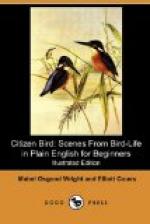“Oh, I know what a ‘parallel of latitude’ is, because I learned it in my geography,” said Dodo, who had been pouting since Nat teased her about the cracked ice; “it’s a make-believe line that runs all round the world like the equator. But what is a ’tree limit’?”
“Don’t you remember, little girl,” answered the Doctor, “what I told you about the timber-line on a mountain—the height beyond which no trees grow, because it gets too cold for them up there? It is just the same if you go northward on flat ground like Orchard Farm; for when you have gone far enough there are no more trees to be seen. In that northern country the winter is so long and cold, and summer is so short, that only scrubby bushes can grow there. Next beyond these we should find merely the rough, curling grass of the Barren Grounds, which would tell us we were approaching the arctic circle, and already near the place where wise men think it is best to turn homeward; for it is close to the Land of the Polar Bear and the Northern Lights—the region of perpetual snow. But dreary as this would seem to us, nest building is going on there this June day, as well as here.
“Running lightly over uneven hummocks of grass are plump, roly-poly, black-and-white birds, with soft musical voices and the gentlest possible manners. They may have already brought out one brood in thick, deep grassy nests, well lined with rabbit fur or Snow Owl feathers, that they know so well how to tuck under a protecting ledge of rock or bunch of grass. Now and then a male Snowflake will take a little flight and sing as merrily as his cousin the Goldfinch, but he never stays long away from the ground where seeds are to be found.
“The white feathers of these birds are as soft as their friend the snow, of which they seem a part. They have more white about them than any other color, and this snowy plumage marks them distinctly from all their Sparrow cousins. After the moult, when a warm brown hue veils the white feathers, and the short northern summer has ended, the birds flock together for their travels. When they will visit us no one can say; they come and go, as if driven by the wind.
“A soft clinging December snowstorm begins, and suddenly you will wonder at a cloud of brown, snow-edged leaves that settle on a bare spot in the road, then whirl up and, clearing the high fence, drop into the shelter of the barnyard.
“‘How very strange,’ you will say; ’these leaves act as if they were bewitched.’ You look again, and rub your eyes; for these same whirling winter leaves are now walking about the yard, picking up grass-seed and grain under the very nose of the cross old rooster himself! Then you discover that they are not leaves at all, but plump little birds who, if they could speak, would say how very much obliged they are for the food.
“When the snow melts they fly away. By the time they have got home again, weather and travel have worn the brown edges of their feathers away, so that the black parts show; and thus, without a second moulting, they are black-and-white birds again.




